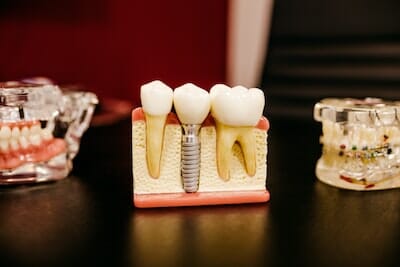Are you tired of dentures or bridges that constantly slip, require special care, or make it difficult to enjoy your favorite foods? Dental implants could be the solution you’ve been looking for. In this blog, we’ll explore the world of dental implants and provide insights that will help you make an informed decision on whether to go for them. We’ll cover what dental implants are, their advantages, the types of implants available, and the procedure involved in getting them. Lastly, we’ll share tips on caring for your implants to ensure they last longer and give you a beautiful, confident smile. Read on to discover everything you need to know before getting dental implants.
What Are Dental Implants?
Dental implants are artificial replacements for tooth roots. They are usually made up of materials like titanium, which provides a stable base for artificial replacement teeth such as crowns, bridges, or dentures. They are inserted into the jawbone through an oral surgery procedure. After the process, the crown is added. Implants can be used to replace single, or multiple teeth or to support partial or full dentures. Often, implants are the most natural-looking restoration option and a great alternative to dentures.
For implant treatment, a CBCT scan is necessary to determine the extent of the surgery and the depth of the implants required. Implants require additional treatments such as gum grafting or bone regrowth before they can be fixed to the jawbone. Therefore, before getting dental implants, it is important to understand the complete procedure and the extra treatments involved.
Dental Implant Procedure
Dental implant treatment is a three-step process. It typically starts with the removal of the damaged tooth, followed by the insertion of the implant and screw, and finally, the attachment of the crown. A period of around three to six months is usually allowed for the implant to integrate into the jawbone properly. The time it takes to heal depends mainly on the quality of bone, age, and dental health of the patient. Regular follow-up visits are necessary to ensure the implant, teeth, and gums are all healthy. The implant treatment has advanced considerably since the time it was first introduced in 600 AD. Today, implant treatment is done by general dentists, periodontists, oral surgeons, or oral maxillofacial surgeons, each offering specialized knowledge in their field of expertise.
Types of Implants
Typically, an implant consists of three parts: the implant post, the abutment, and the dental crown. The implant post is typically made of metal and is surgically placed into the jawbone. It then fuses with the bone tissue over time to provide a strong anchor for the dental crown.
There are different types of implants available for different situations. Mini-implants are used in orthodontic movement to help move the teeth and shorten treatment time. Plate Form Implants are also an option and consist of thin plates surgically placed into the jawbone. Implant dentistry has a long history, dating back to the Mayans’ use of shells to replace mandibular teeth. It’s important to discuss with your dentist which type of implant is best for you based on your specific dental needs.
Advantages of Dental Implants
If you’re missing teeth and want a long-term solution that looks and feels natural, dental implants may be the answer you’re looking for. Dental implants provide numerous advantages, one of them being they restore your ability to chew properly and improve the cosmetic appearance of your mouth. They are a low-maintenance option compared to dentures, which require regular cleaning and maintenance. Additionally, dental implants feel natural and can withstand normal wear and tear, with a success rate of up to 98% with proper care.
Dental implants not only improve quality of life by improving chewing function but also have a positive impact on preserving the health of surrounding bone and gums. Furthermore, implants help keep adjacent teeth stable, maintain the shape of the face, and support the jawbone. If you’re considering getting dental implants or other tooth replacement options, it’s important to discuss with your dentist which option is best for you based on your oral health and individual needs.
Caring for Your Dental Implants
After getting dental implants, it’s crucial to care for them just like natural teeth. Regular check-ups with a dentist are crucial to monitor the implant, teeth, and gums to ensure they are healthy. Brush your implant at least twice a day with a soft brush, the same toothpaste that you use on your natural teeth, and floss regularly. Use an anti-bacterial mouth rinse daily for the lifetime of your dental implants. It’s advised to avoid sticky snacks and hard foods that can damage the implants. Regular professional cleaning and maintenance are also essential for healthy implants. With proper care, dental implants can last a lifetime, giving you a beautiful natural-looking smile.
Conclusion
In conclusion, dental implants are a long-term investment in your oral health and overall well-being. Before going for the procedure, it’s essential to know what you are signing up for, the type of implants you need, the procedure, and how to care for them. Dental implant surgery requires time, patience, and skill, but it’s worth it when you find your smile restored, your bite function returned to normal, and your confidence replenished. To learn more about dental implants, their advantages and disadvantages, and what to expect during the procedure, contact us today Eastgate Dental Excellence. They can guide you and develop a tailored plan to ensure you get the best possible outcomes.

